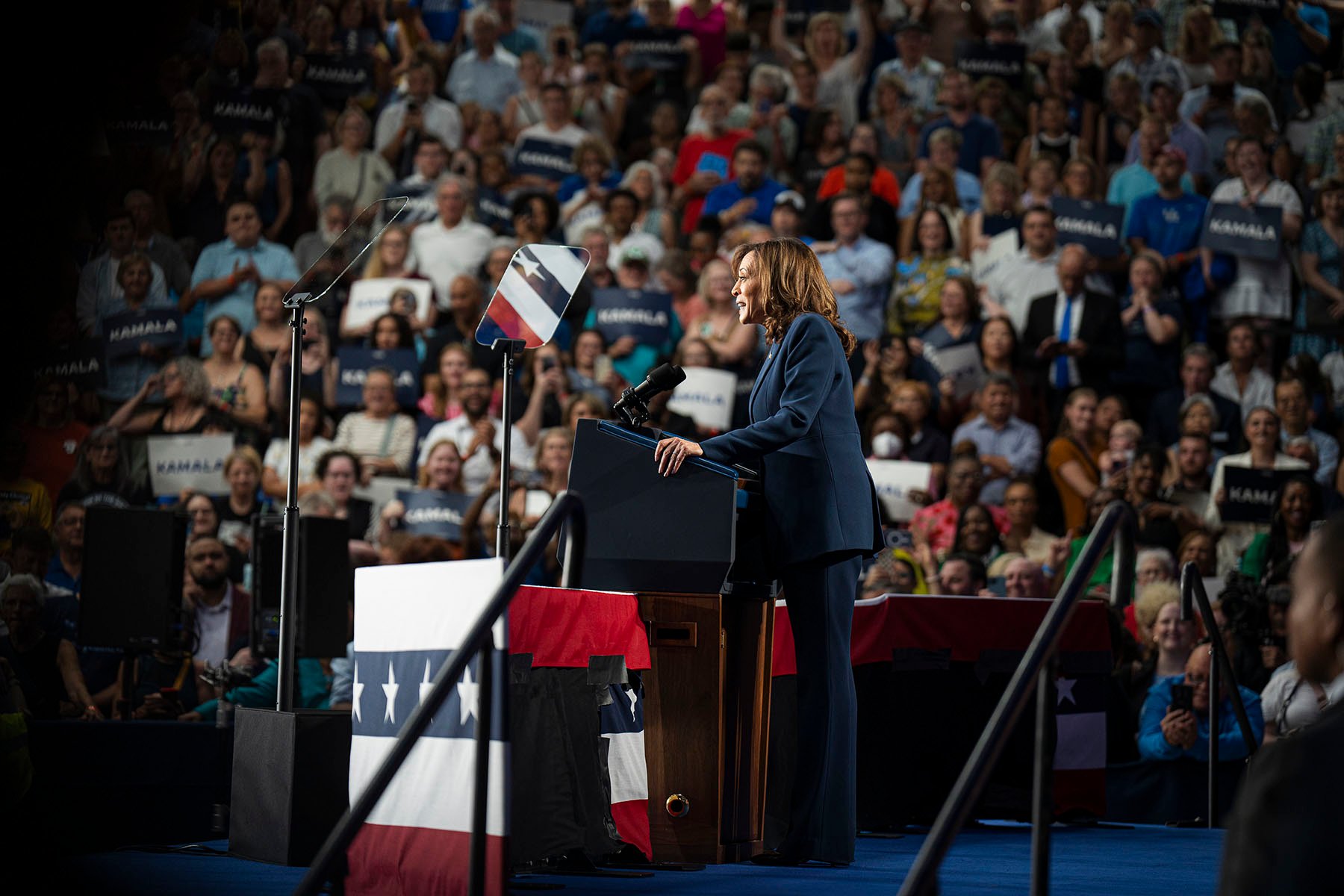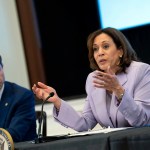Your trusted source for contextualizing Election 2024 news. Sign up for our daily newsletter.
Terri Lynne Hudson was thrilled when she first heard about the Disabled Voters for Harris Zoom call.
Hudson, 51, lives in Chicago and describes herself as a “working artist” — she narrates audiobooks, does voiceover work and has stage acting experience. Hudson also has spina bifida and an autoimmune condition and has done work around accessibility in theater. She is politically active and has voted in every election since she turned 18, describing herself and her family as “voting people.”
“I mentioned excitedly to a friend that I had some questions prepared. I was hoping this was going to be that sort of thing. And my friend was like: ‘I bet, they’re just going to ask you for money,’” Hudson told The 19th.
The call turned out to be neither. Instead, over the course of two hours on Friday, organizers and panelists gave instructions on how to vote with a disability, encouraging viewers to explore options like curbside and absentee voting. Despite being asked numerous times by attendees, organizers refused to discuss policy.
“I’m just sitting here like, why are you acting like we are all 100 percent brand new? There are politically active disabled people. It bothered me that this was going on this weird assumption that we don’t know how to vote. That’s a completely different thing from talking about the candidate and the platform and why we should be for Harris,” Hudson said.
As diverse groups of voters — Black men and women, White women and “dudes,” Latinx and AAPI people — continue to mobilize on Zoom around the Democratic presidential campaign of Vice President Kamala Harris, organizers of the Disabled Voters for Harris call saw an opportunity for representation and visibility. And while they consider the call a success, participants and others in the disability community are frustrated and disappointed by what happened before, during and after the call took place, including possible campaign finance violations, a lack of buy-in from the Harris campaign promised by organizers and even the exposure of callers’ email addresses. Organizers have also declined to disclose precisely how many people attended or how much money was raised.
Hudson said she left the call early, fed up with what she described as the lack of substance.
“They focused on getting out the vote. OK, but why get out the vote? What are we here for? What are we voting for? That was missing,” she said.
The Disabled Voters for Harris call was created and announced in late July by Cassidy Huff and Jayne Mattingly, both social media influencers and disabled advocates. They were joined by fellow social media influencers and advocates Zibora Gilder, Akilah Cadet and Aut2Ask, an anonymous account that has since withdrawn from the project. None had previous campaign organizing experience.
“I was just scrolling through Instagram posts and I saw that my friend Jayne Mattingly had posted about the Win With Black Women call and the White Women for Harris call. And she posted, ‘Where is the disabled voters for Harris call?’ So I reached out to Jane and I said, ‘Hey, I would love to help put something like this together,’” Huff said.
Later that night, they made and posted a graphic advertising a Disabled Voters for Harris call. The post took off on social media, boosted by Shannon Watts, the organizer of the White Women for Harris call, and Jotaka Eaddy, founder of Win With Black Women. According to Huff, “about 1,900” people registered for the call in the week the Disabled Voters for Harris link was circulating.
Soon, the call also caught the attention of over a dozen national disability organizers and veteran campaigners. Early materials advertising Disabled Voters for Harris included Mia Ives-Rublee, a longtime progressive disabled organizer, and Leslie Templeton, the chair of the Disability Issues Caucus for Young Democrats of America. About half a dozen other disability leaders were also involved behind the scenes.
However, all dropped out in the days approaching the call, and all declined to comment about why on record.
A few organizers did post about the issue on X, the social media platform formerly known as Twitter. Specifically, they pointed to a potential campaign finance violation. The day before the call, Huff put up a post selling disability vote-branded bags on the Disabled Voters for Harris Instagram account, promising to donate 10 percent of proceeds to the campaign.
That planned sale would have been a violation of federal law.
“Campaign finance law says that donors to the campaign need to have their information publicly disclosed,” said Dominic Kelly, a senior adviser on disability for Stacey Abrams’ campaign when she was running for governor. He was slated to appear on a Disabled Voters for Harris panel but pulled out because of a prior commitment.
“The Harris campaign needs information like my address, employer and occupation in order to fully disclose their contributions. So selling merchandise and donating on behalf of an individual means you can’t track where those contributions came from,” he said.
Disabled writer and advocate Vilissa Thompson and Emily Voorde, who worked for the White House under President Joe Biden and on Pete Buttigieg’s presidential campaign, also posted about the potential campaign finance violation. Voorde has since deleted her post and declined to comment.
Disabled Voters for Harris organizers refused to answer questions about the post, but they did take it down. Huff posted a follow-up video stating that no proceeds from her merchandise had been given to the Harris campaign.
But by then, disability leaders had dropped out of the call.
In response, Cadet, a call co-organizer, made a post on X stating that unnamed disabled organizers who ended their involvement engaged in “white supremacy.”
None of the organizers would name who Cadet or the post were referring to or what happened, despite multiple requests for comment.
“I don’t know what you’re talking about,” Jayne Mattingly, a co-organizer, said when asked directly.
A post to the Disabled Voters for Harris Instagram account subsequently stated that Cadet had “experienced discrimination within Disabled Voters for Harris and as a group we have zero tolerance for harm. When a former leader was held accountable for their harmful actions, they chose to leave instead of do the work needed for collective leadership.”
The same post also referred to a “predatory journalist resulting in slander of the committee” before any articles had been published about the committee or event.
“I’m very familiar with this. I’ve done so much press. Who gave you this angle? Why aren’t you building up the disability community?” Mattingly said during a phone interview with The 19th the day before the post appeared on Instagram.
Organizers also stated during the call and in interviews that they were “officially supported” by the Harris campaign. Prior to the call, Huff told The 19th that: “The Harris campaign is fully aware of what we’re doing and supportive of everything they’re doing. They will be watching the call tonight.”
However, there were no Harris campaign representatives on the call. Disabled Voters for Harris did not have a unique, approved campaign fundraising link and instead used a Brown Girls Fundraising Collective link from Win With Black Women.
Win With Black Women has allowed multiple affinity groups to use their link for fundraising purposes, in addition to providing technical assistance.
“As the first group to use this organizing tactic at this scale and in line with our mission to empower people from long-silenced communities, Win with Black Women has offered our support to those reaching out for guidance on how to organize via Zoom,” a Win With Black Women spokesperson told The 19th.
According to Mattingly, the call had “up to 600” participants, but she declined to provide a precise number.
“We weren’t focused on how many live attendees were showing up. During the call, we were engaged with all of the people being seen and heard, as there were so many different disabilities at the event. This was such a joyous event, it was one of the coolest events that was again being seen by so many different people,” Mattingly said.
In an email, Gilder told The 19th that the call had been “one of the largest events of disabled people since the Capitol Crawl in 1990.” Tom Olin, a photographer who documented the event, pegs the number of protesters present at around 700, but only 60 crawled up the Capitol steps.
Several disability organizations have national conferences that attract thousands of disabled participants every year. The National Federation of the Blind, for example, had approximately 2,500 attendees at their national convention in Orlando, Florida, this year.
Mattingly also wouldn’t discuss how much money was raised.
“I don’t know why you’re focused so much on metrics right now, instead of the joyous nature of the call,” she said.
A number of people who signed up for the call did not receive a Zoom link. Others received a link after the event, from an email address associated with a private business owned by Gilder, one of the co-organizers. The email from Gilder’s business, Empowered Hands Houston, was sent to 499 people on the Disabled Voters for Harris distribution list — and didn’t use bcc. Empowered Hands Houston is an employment agency for deaf and hard of hearing people that does not have an active website. Despite being a private business, the email sent out to Disabled Voters for Harris mailing list members asked people to “donate” and volunteer.
People who signed up for the list expecting Disabled Voters for Harris materials were upset about the violation of their privacy.
Jessica Pelasky, 40, lives in Mansfield, Ohio, and had her email address revealed. She has osteogenesis imperfecta, a disability that causes her bones to break easily, and uses a wheelchair. She works as a consultant and has “voted in pretty much every election since turning 18.”
She was not pleased that her email address had been made public in association with the Disabled Voters for Harris call.
“I felt like my privacy was taken advantage of. I don’t tell people who I’m voting for. I don’t feel like it’s their business to know who I’m voting for. My name was on that email chain because my email address is my name,” she said.
Pelasky is uncertain about whether she would want to attend another session with this group of organizers.
“It kind of makes me feel sad, because I think an organization like this is highly needed at this time. But I’m not sure that I would trust [Disabled Voters for Harris organizers] again,” she said.
If a different group organized a similar event, she would “100 percent attend.”
It appears that another call is in the works, organized by some who left the original Disabled Voters for Harris call and other longtime disability advocates who were not previously involved.
“I think it’s pretty cool that our community is so big and diverse that we can have multiple calls that happen. There’s so much enthusiasm from the disabled community,” said AJ Link, an autistic advocate based in Washington, D.C., who was not involved in the original Disabled Voters for Harris call.
Link and his group are committed to ensuring accessibility and diverse representation on the second call, and that may take a little longer.
To Link, the call has two primary purposes: to make a case for why Harris is the best candidate for the disability community and to demonstrate the size and power of the disability community to the Harris campaign.
“We want to show the political power of disabled folks and communicate the policy priorities of a powerful constituency. We want to let the Harris campaign know we want to be part of the broader coalition, and we don’t want to be taken for granted or ignored,” Link said.





